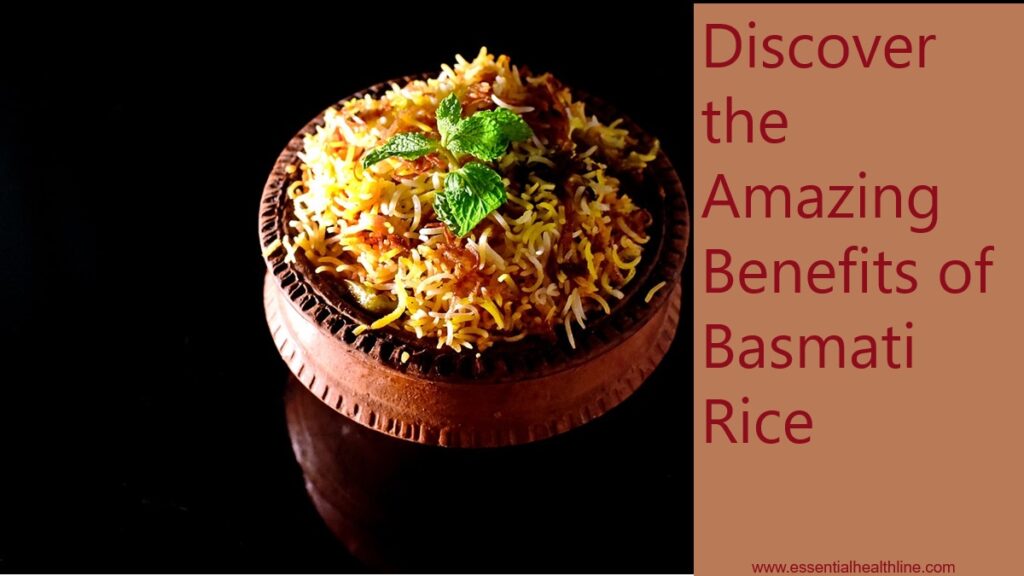Have you ever visited a restaurant and ordered rice only to be served sweet, good-smelling rice with a fluffy texture? You might have fallen in love with the aromatic rice and wanted to try it at home. Right? That’s basmati rice! In India, “Basmati” means “fragrant” or “full of aroma.” That’s why some Hindus call it the “Queen of perfumed rice.”
Besides the sweet aroma and great taste, does Basmati rice have any health benefits for your body? One of the health benefits of basmati rice is that it’s low in calories, unlike most other types of rice.
Also, its high fiber content and low glycemic index make it an excellent choice compared to other foods. Still, basmati rice is rich in essential minerals and antioxidants. Whole-grain basmati rice is, however, more nutrient-packed than the refined white type.
Below, I’ll discuss more health benefits of Basmati rice and how to prepare it. Read on.
Health Benefits of Basmati Rice
Commonly found in India, Basmati rice comes in two varieties: white and brown. Both varieties are used differently to give dishes a royal touch.
Basmati is a long-grain rice with a nutty taste and distinctive smell, and it is widely grown in Asian countries and India. Basmati rice is today’s Indian dish’s staple food, but it’s also enjoyed worldwide.
Interesting Read: Health Benefits of Golden Berries
Since the white variety is highly processed, brown is best for an aromatic, healthy diet. Why? The germ, hull, and bran are removed while the white basmati variety is processed. On the other hand, only the hull is removed on the brown variety.
The health benefits of basmati rice are attributed to its nutritional value. It’s rich in calcium, zinc, dietary fiber, and iron. It’s, however, low in glycemic index. Basmati rice is gluten-free and is also a low-carb diet. Hence, it is ideal for diabetes patients and people sensitive to gluten.
So, why is basmati rice healthier, and what does it do to your overall health?
Rich in Minerals
Basmati rice is rich in minerals essential for strong teeth and bones and converting eaten food into energy. So, basmati rice is a healthier option, as it is rich in magnesium, iron, phosphorus, copper, and zinc.
Good Source of Dietary Fiber
Basmati rice offers numerous health benefits because it is rich in soluble fiber, essential for making stool bulk. Hence, passing stool becomes easier, and the chances of constipation are lower. This could lower the chances of developing certain types of cancers.
On the other hand, dietary fiber could lower the risk of developing type 2 diabetes. Fiber is also essential for the gut as it feeds the good bacteria.
Even so, brown rice is higher in fiber than the white basmati variety.
It’s Low in Arsenic
Rice, compared to other grains, is high in arsenic, which is highly toxic to your health. Rice is high in arsenic because it’s a semi-aquatic grain. It’s this growing environment (water) that contaminates it.
This heavy metal is a natural element, and it increases the risk of colorectal cancer and diabetes. It can also increase the risk of heart disease. This could be a potential hazard for rice lovers.
Thankfully, basmati rice is low in arsenic. What’s more? Basmati rice from Pakistan, California, and India is considered lower in arsenic than other varieties.
Even so, the hard outer Basmati bran layer is high in arsenic. Consequently, brown basmati rice has more arsenic than the white variety.
To reduce the amount of arsenic in your rice, thoroughly rinse it before cooking it.
Rich in Beneficial Nutrients
Besides dietary fiber and minerals, basmati rice has other beneficial nutrients your body needs to function correctly. The nutritional value varies based on the basmati variety you’re eating.
For example, brown basmati varieties of rice are higher in zinc, fiber, vitamin E, potassium, calories, magnesium, carbs, and phosphorus.
Interesting Read: Health Benefits of Iced Tea
Below is the general nutritional value of basmati rice.
| Nutritional | Value |
| Fiber | 0.7 grams |
| Magnesium | 5% of the DV |
| Carbs | 45.6 grams |
| Thiamine | 22% of the DV |
| Calories | 210 |
| Copper | 12% of the DV |
| Zinc | 7% of the DV |
| Protein | 4.4 grams |
| Selenium | 22% of the DV |
| Iron | 11% of the DV |
| Fat | 0.5 grams |
| Sodium | 399 mg |
| Vitamin B6 | 9% of the DV |
| Folate | 24% of the Daily Value (DV) |
| Phosphorus | 6% of the DV |
| Niacin | 15% of the DV |
Is Basmati Rice OK for Diabetics?
Basmati rice is considered more diabetic-friendly than any other type of rice because the glycemic index (GI) ranges between 50 and 58. With such a low to medium GI, diabetic patients may eat basmati rice. Why?
Low glycemic foods allow the metabolism of dietary sugars into glucose. So, if your doctor permits you to eat basmati rice in moderation, your sugar levels should not fluctuate since the GI is low.
Even so, how you cook your rice could increase or lower the GI levels. For example, if you overcook rice, the GI increases and makes it dangerous for diabetic people and everyone else. So, avoid boiling your rice for too long.
Though white basmati rice is safer than other white kinds of rice, it can still expose you to type 2 diabetes or adversely affect your blood sugar levels. According to a study, white rice increases the risk of obesity. So, also take white basmati rice in moderation and cook it professionally.
What Happens if We Eat Basmati Rice Daily?
Though basmati rice is higher in nutrients than other types of rice, the white variety may not be suitable to eat every day. White rice is high in carbs and calories. So, eating the white basmati rice variety can increase the risk of metabolic syndrome, which could heighten the chances of getting stroke, heart disease, or type 2 diabetes.
On the other hand, brown basmati rice is also rich in arsenic; hence, it may also be a bad choice for your daily intake.
Which Kind of Rice is the Healthiest?
Whole grain rice is considered the healthiest rice.
Hence, choosing the brown basmati variety, even if you do not have diabetes, is wise. Even so, all brown varieties are considered to have the same nutrients.
If there’s any difference, it’s small. For example, basmati brown rice is low in arsenic. Hence, it could be a great choice if rice is a staple food in your home.
Parting Shot
This type of long-grain rice is a good choice as it is rich in beneficial nutrients, for example, minerals and fiber. Besides, though this long-grain rice has arsenic like other types of rice, it’s not so high to cause alarm if you’re not eating it daily. Besides, it could also be great for weight management as it’s a low-carb diet.
What’s more? Since basmati rice has a lower glycemic index when appropriately cooked, it’s an excellent choice for diabetic people. So, if you’re ordering rice from the grocery store, order basmati to safeguard your heart health and digestive system.
Why? The health benefits of basmati rice are numerous; take advantage of them. If you have diabetes, contact your doctor to confirm whether you can eat any of the basmati rice varieties.



